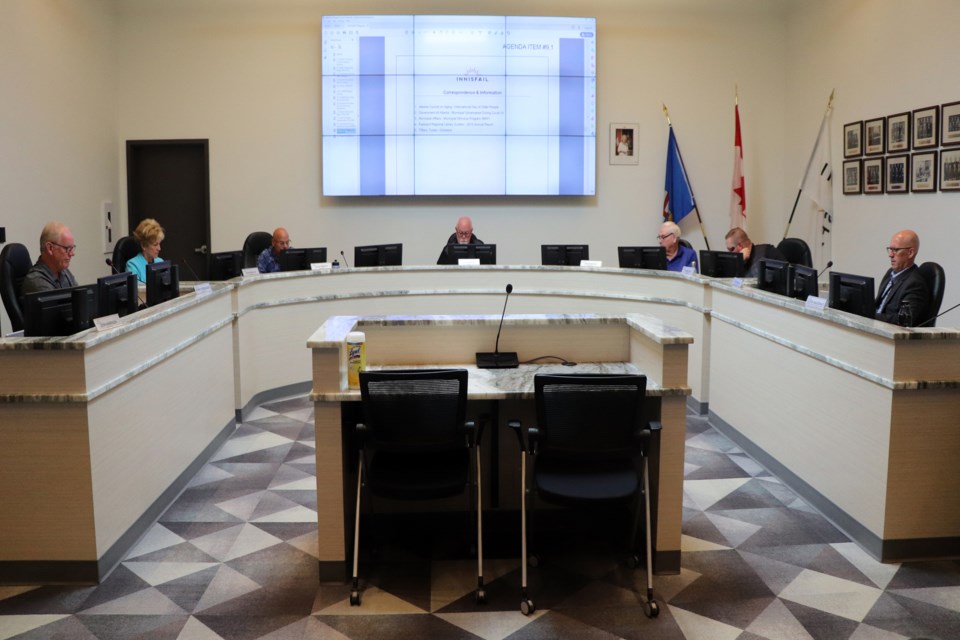INNISFAIL – The feathery testy flap of urban chickens has once again landed on town council’s table, with the possibility the highly charged emotional issue could be settled through a legally binding referendum vote in next year’s municipal election.
The contentious issue, which was turfed by town council in a shocking decision in 2018 despite overwhelming public support through a town-sponsored survey, was addressed by Coun. Don Harrison at council’s regular meeting on Aug. 10.
“It’s been raised two years later by a constituent and I think we have to address it,” said Harrison, noting there was a letter in council’s agenda package inquiring about the urban chicken issue. “There’s been numerous communities that have upped their licenses and they have implemented more fowl in their communities. I think it’s just an opportune time to bring it back and look at the information that’s out there and go forth with it.”
Harrison noted that a letter to the town by new local resident Tiffany Tunke asked if council would now be in favour of allowing four chickens per household. Tunke, a passionate urban chicken advocate, noted in her letter that council’s past decision to outlaw pet fowl was based on smell, appearance and noise, which she added, infringed on citizens rights.
“The local crows are louder than chickens and I don’t see any bylaw against them,” said Tunke, who spoke to The Albertan last week. “It doesn’t make any sense. People are allowed to keep birds in their house. If you have a pet like a robin you can eat their eggs, so what is the difference?”
Harrison wanted to know whether the issue could be readdressed, noting the six-month timeline to reintroduce a past motion has long passed.
Mayor Jim Romane told Harrison that any councillor has the “absolute right” to give notice of a motion if they are prepared to reopen an issue.
“That is your right as a councillor. You can make that motion,” said Romane. "If we want to reopen it there is not statute of limitations or anything on it.
“You can put it to the test of council and if they support it, we would reopen it and proceed with the consideration.”
Following a suggestion by Coun. Jean Barclay, council then approved a motion for administration to review the experiences of other Alberta communities that have allowed urban chickens, and bring a report back to council. The motion passed by a vote of 5 – 2, with councilors Glen Carritt and Danny Rieberger opposing.
A similar review was done by administration in 2018 during the town’s comprehensive study into the urban chicken issue.
“I personally have no interest to revisit this. We’ve been down the road. What I keep hearing is, ‘I will allow chickens as long as it’s not next to me.’ Well, it doesn’t work that way,” said Carritt during the council discussion. “I have no interest to revisit. I think we can address the email, and that’s my opinion.”
However, Harrison countered to Carritt he has a heard a different take on the issue in the community.
“We can flip that around and people I have been talking to (said) they would love to have four chickens,” said Harrison.
Rieberger said he opposed the motion because there was already extensive research made by administration of other community pet chicken programs in 2018. He added that just “one letter from one person” to reopen an issue “did not seem much of a trigger” to him.
However, he did say that if the urban chicken issue has to go back to the public to settle once and for all it should be put to a legally binding referendum vote in a question to local voters alongside next year’s municipal election.
“Because if you put something controversial on there you get people out to vote, you get an increased turnout and people can only vote on it once. It would be a real scientific survey that way,” Rieberger told council.
Romane said in an interview after council he has “no problem’ with a legally binding referendum on the issue if council wants to do it.
“Maybe it’s the way to solve it once and for all,” said Romane. “I would give it some serious thought.”
Harrison agreed but added the town needs all the necessary information to pass on to citizens to ensure voters make an informed decision.
“You just can’t go to the ballot box and mark yes or no,” said Harrison. “If we decide to go to a referendum, which I think is a great idea, we will get more people out to vote on this issue, and we only get one, but they need data to make that informed decision. They need information.”
Harrison said it was important to raise the issue because the town went out to the community with a survey in 2018 and citizens voted “overwhelmingly” in favour of allowing pet chickens but council turned it down anyway.
“As council we talk about transparency and public engagement,” he said. “We could have handled it through a pilot (program), having two licences and assessing it for a year. We didn’t. It was just a flat no we are not going to have fowl in our community.”
In the fall of 2018, the town’s survey results from its comprehensive public engagement initiative showed 627 citizens cast their votes on whether the community should have an urban chicken program. From that total vote, 411 (66 per cent) were in favour of allowing pet chickens in the community against 204 (32 per cent) who said no.



